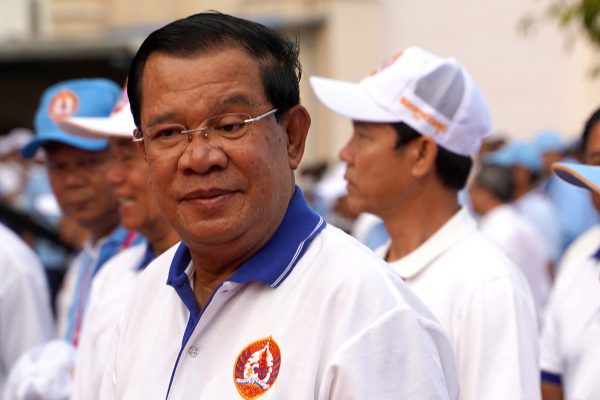The founding of the CNRP in 2012 — through a merger between former opposition parties the Sam Rainsy Party and Kem Sokha’s Human Rights Party — marked a new period for Cambodia’s democratic transition.
It led to a more even balance of power in Cambodia’s domestic politics. Prior to its dissolution in 2018, the CNRP was popular and secured nearly half the total votes in Cambodia’s 2013 election. The CNRP was the only viable opposition party and secured 55 seats out of 125. The incumbent Cambodian People’s Party (CPP) held 68 seats, losing 22 to the CNRP. In the communal elections in 2017, the CNRP won 489 of 1646 commune chief positions despite facing repression and harassment.
The increasing power of the CNRP resulted in negotiations between the ruling and opposition parties in 2015. The negotiations did not produce fruitful results and indicated former Prime Minister Hun Sen was willing to talk with opponents to co-opt individuals and weaken the opposition. Despite Cambodia’s weak political system, negotiations showed there could be compromises from the ruling party if the opposition became powerful enough.
The CNRP showed Cambodian people that they can influence their government. During the CNRP’s existence from 2012–17, the government was very cautious about arresting top CNRP leaders, including Kem Sokha and Sam Rainsy. But the party was eventually dissolved in 2017 — with allegations that Kem Sokha had plotted against the government while Sam Rainsy had insulted Cambodia’s king. Such allegations gave the government sufficient reason to have the CNRP dissolved by the Supreme Court. The government uses the court system to detain and oppress former CNRP members and other opposition parties considered future threats to the CPP.
The arrests of former CNRP members — particularly the 2023 decision of the Phnom Penh Municipal Court to sentence Kem Sokha to house arrest for 27 years and ban him from participating in politics — greatly hinder Cambodia’s democratic transition.
Putting Kem Sokha under house arrest will eliminate Cambodia’s electoral competition by removing the only viable opposition party. The National Election Committee claims 20 political parties had registered for the election in July 2023. Yet the absence of a viable opposition party means this election will not be democratic. Without seats in the National Assembly, the ballot presence of other parties means little for Cambodia’s democracy.
Kem Sokha is a symbol of democratic transformation in Cambodia. His struggle has not been overlooked, as shown by visits from top government officials from Western countries. On 15 February 2023, German President Frank-Walter Steinmeier met with Kem Sokha, following his meeting with Hun Sen. US Secretary of State Antony Blinken, Australian Foreign Affairs Minister Penny Wong, and High Representative of the European Union for Foreign Affairs and Security Policy Josep Borrell have also paid visits to Kem Sokha.
Frequent visits from democratic countries indicate democracy remains important in their relations with Cambodia. Regardless of Kem Sokha’s strong competition, Cambodia’s election results have always been questioned by the United States and other Western countries. This was apparent in the 2018 election, where China was the only country to recognise the election’s result. Only a few countries, such as China and Vietnam, sent congratulatory messages to the CPP for winning the 2023 election.
For the election to be recognized by the United States and Western countries is significant since it will allow Cambodia’s new mandate to mend relations. The United States and Western countries are Cambodia’s largest markets, with Cambodia exporting around US$12.2 to the United States and US$4 billion to Western countries in 2022. This indicates that Cambodia’s economic growth cannot be detached from US and Western markets.
To maintain economic development, Cambodia cannot become subject to US or Western economic sanctions. Maintaining economic development may be Cambodia’s main priority under the leadership of Prime Minister Hun Manet. This appears to be the case with the appointment of Sok Chenda Sophea as the minister of Foreign Affairs, since he has an economic background as the Secretary General of the Council for the Development of Cambodia, an institution responsible for investment in Cambodia.
Hun Manet also reiterated the need to improve the economic wellbeing of the Cambodian people. This signals that the Cambodian government will focus on building and strengthening economic relations with other countries. On 4 August 2023, the Cambodian government also requested that the US Generalized System of Preferences (GSP) be renewed so that some of Cambodia’s products can continue to be exported to the United States without incurring duties.
To continue benefiting from the GSP, the incumbent Cambodian government will have to open political space for the opposition party and youth activists, and review Kem Sokha’s verdict.
Kem Sokha does not have the political power that he did in the past. Most of the CNRP’s former members have either been jailed or joined the ruling party. Kem Sokha is no longer as powerful an opponent to CPP — but is still a symbol of Cambodia’s democracy. Releasing him will make it easier for Cambodia to mend relations with the United States.
Even if Kem Sokha is allowed more political freedom, it is unlikely he can challenge the CPP’s hold on power. There have been divisions among former CNRP members and the ruling party is seen to be doing a great job of addressing social issues and increasing Cambodia’s image in the international arena.
Sokvy Rim is Research Fellow at the Cambodian Institute for Cooperation and Peace (CICP).

